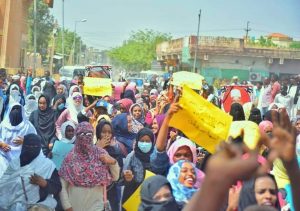Joint Statement: Don’t Leave Sudanese Women and WHRDs Behind
The undersigned organizations are gravely alarmed at the multiple dangers and threats  Sudanese WHRDs face since the beginning of the war between the RSF and SAF. These threats continue to escalate and jeopardize the health and safety of Sudanese WHRDs including those who have been able to evacuate Sudan, or are in the process of leaving. Most of the WHRDs face huge risks and do not have much needed support from the government or international community to enable them to relocate safely.
Sudanese WHRDs face since the beginning of the war between the RSF and SAF. These threats continue to escalate and jeopardize the health and safety of Sudanese WHRDs including those who have been able to evacuate Sudan, or are in the process of leaving. Most of the WHRDs face huge risks and do not have much needed support from the government or international community to enable them to relocate safely.
A joint brief issued in May 2023 warned against the imminent threats and difficulties faced by Sudanese WHRDs, including death threats from both warring parties. Others have witnessed family members killed and threatened due to their defense of democracy and human rights (women’s in particular) and demanding necessary humanitarian aid. They have also experienced raids and looting of their houses by warring factions, before setting them on fire. These dangers increased a few weeks after we released a joint brief, as Sudanese WHRDs continued to work on documentation of war crimes, including GBV against women and girls in Sudan. While these dangers are directly linked to their work, they also faced, and continue to face, multiple threats to their health and safety as they battle the atrocious situation in Sudan where many medical facilities are out of service, banks are closed, and several epidemics have spread within the country, including malaria. This health and humanitarian crisis is compounded by the almost complete collapse of the country’s infrastructure and lack of essential services such as water and electricity, in addition to the continuation of the heavily weaponized war. In fact, a WHRD member of the WHRDMENA Coalition tragically lost her life while trying to flee Sudan, after contracting malaria while struggling with a pre-existing condition. Her untimely death was a direct result of the lack of medical services and access to medicine, and lack of safe crossing passages that include provision of medical services.
Moreover, WHRDs trying to flee the country, and those who are either waiting at the borders of neighboring countries or temporarily residing in third countries, face multiple challenges. Those who are still inside Sudan face life-threatening conditions due to their intentional targeting as feminists, lawyers and physicians, or the war itself, or lack of primary services detrimental to maintaining their health. It is estimated that 80% of WHRDs who fled Sudan are currently in Egypt, while 15% are in Kampala, Uganda. Others are stuck in Ethiopia and South Sudan as cross-over destinations with many challenges, in addition to Chad. While a limited number of feminist and human rights organizations with limited funding were able to provide some assistance to a few Sudanese WHRDs, many more remain stuck inside Sudan, on the borders, or in countries where their ability to work remains limited by security risks and lack of resources. Some are also separated from their families, or are trying very hard to reunite with their families in safe countries to no avail.
Women rights groups in Sudan are facing unprecedented risks, as most of them have lost their capacity to work. The majority of women groups in Sudan have lost their main offices, equipment and financial resources. Despite these challenging conditions, women’s groups and WHRDs are the main responders to the crisis on the ground along with other youth groups and local civil society. The International community has greatly failed the Sudanese people, and women in particular, during the last 4 months of the war. According to OCHA, only 3% of the 4.2 million women and girls in need of protection from Gender Based Violence have received support from April to July. Out of 2.6 billion dollars needed for providing urgent aid to Sudanese people, only 24% was received. Local women’s groups are leading responses to close gaps, as Sudanese women are left neglected and forgotten.
In light of the above, the undersigning groups demand that:
- UNHCR must open more effective passages for Sudanese people to pass safely, including WHRDs.
- UN member states and governments must provide immediate and unconditional assistance to WHRDs, including funding for their evacuation and that of their families, and arrangements for their arrival at safe final destinations. Costs of evacuation continue to rise, and overwhelming needs must be addressed swiftly.
- Women’s groups in Sudan must be supported to rebuild their capacity to work under these challenging circumstances and to contribute effectively to the crisis responses led by local actors.
- Both the international community and the international feminist movement need to provide more support to Sudanese WHRDs, and exercise their solidarity with them as was done with WHRDs and feminists from Afghanistan and Ukraine.
- The Commission on human rights in South Sudan had its mandate renewed per A/HRC/RES/52/1 for another year, and consequently, needs to continue carrying out its mandate, in addition to OHCHR being committed to “provide all the administrative, technical and logistical support and personnel necessary to enable the Commission on Human Rights in South Sudan to carry out its mandate”.
Signatures:
The Regional Coalition for WHRDs in SWANA (also known as WHRDMENA Coalition)
CIVICUS
Sudanese Women Rights Action

